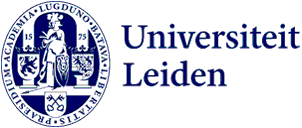
Occupation makes for eventful Cleveringa Lecture: ‘Protect free spaces for debate’
Despite an eventful afternoon – with Students for Palestine occupying the Academy Building – political scientist Hélène Landemore gave her Cleveringa Lecture as planned on 26 November. She reflected on the protest and the importance of open debate, within the university and within a democracy.
A demonstration, an occupation and a change of venue: the run-up to the Cleveringa Lecture on 26 November this year was turbulent. It was exactly 85 years ago that Dean of Law Rudolph Cleveringa gave his protest speech in the Academy Building against the dismissal of Jewish professor Eduard Meijers. The university commemorates this with its annual Cleveringa Lecture. A group of Students for Palestine demonstrators occupied the Academy Building on Wednesday afternoon. They said they were protesting in the spirit of Cleveringa’s legacy and demanded a full boycott of Israeli universities.
The university previously froze its exchange programmes with Israeli universities and a special committee will soon issue its advice on academic collaborations. The police cleared the Academy Building later that evening.
Reflection on protest
Yale professor Landemore spoke briefly with the demonstrators about their protest before leaving for the Kamerlingh Onnes Gebouw to give her lecture there. She and Rector Hester Bijl both reflected on the protest. ‘The demonstrators want us to break our ties with Israeli institutions because of the terrible situation in Gaza,’ said Bijl. ‘Despite us having to move here, this event fits the topic of today’s lecture – ensuring different voices are heard – and is therefore also in the spirit of Cleveringa.’
Landemore also showed understanding of the situation. ‘People demonstrate when they are angry and feel they are not being listened to. Democracy is messy. Universities have the responsibility to protect spaces where people can speak freely.’ This also made it important, she implied, for the lecture to go ahead.
Citizen assemblies
In her lecture, Landemore called for randomly selected citizen assemblies. ‘When you exclude voices, you condemn yourself to ignorance and bad governance.’
Referring to Cleveringa’s protest speech, she added, ‘I am, like him, worried about exclusions, albeit ones that happen much upstream of the fascism he was combating. I want to build dams and help shore up our existing systems against the ever-present dangers of authoritarianism and democratic backsliding by fixing democratic exclusions.’
Only a regime that includes all voices is capable of providing its rulers with the knowledge they need, she said. ‘When you exclude voices, whether it’s women, black people, the uneducated or the poor, you actually condemn yourself to ignorance and bad governance.’
-
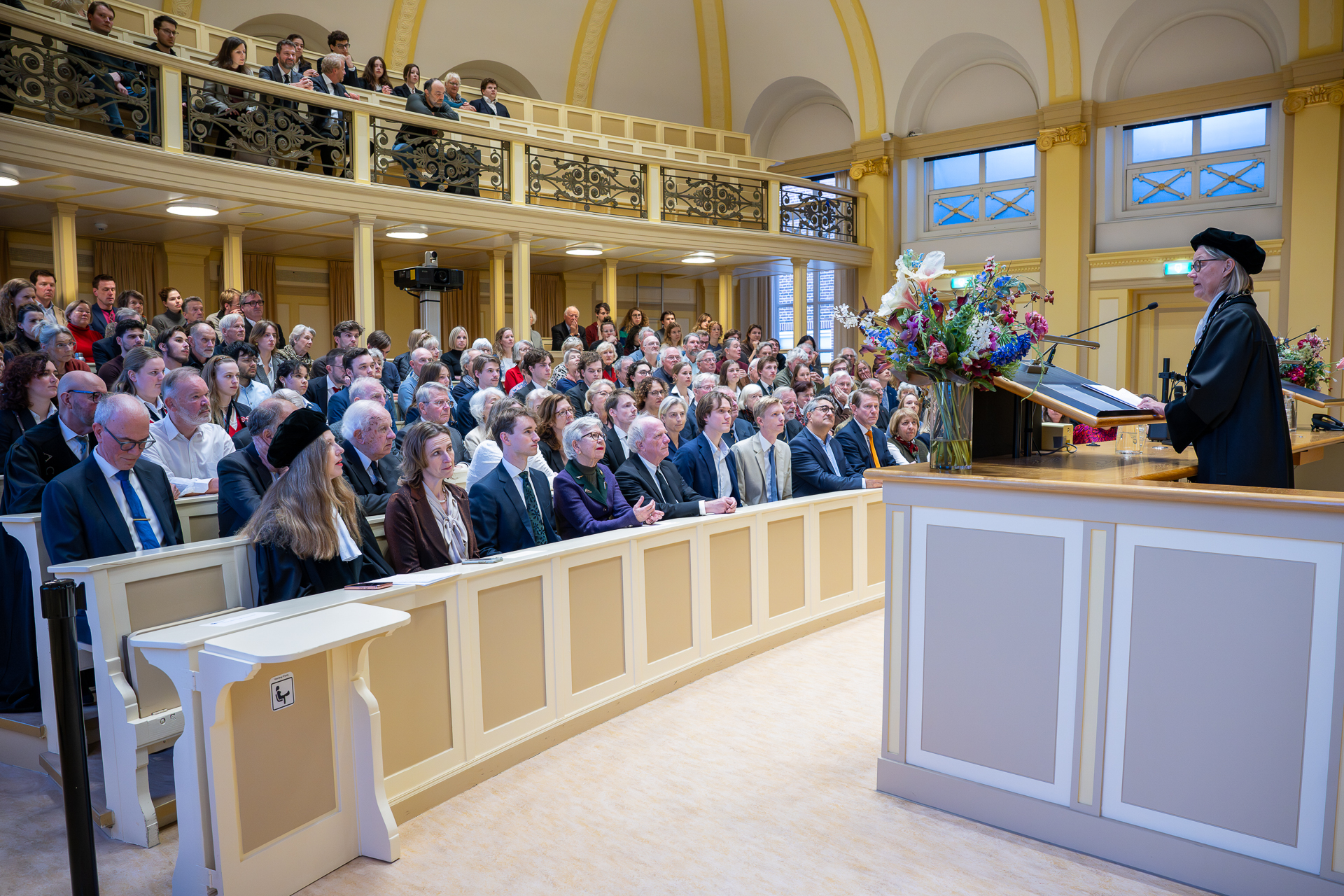
Rector Hester Bijl welcomed the audience -
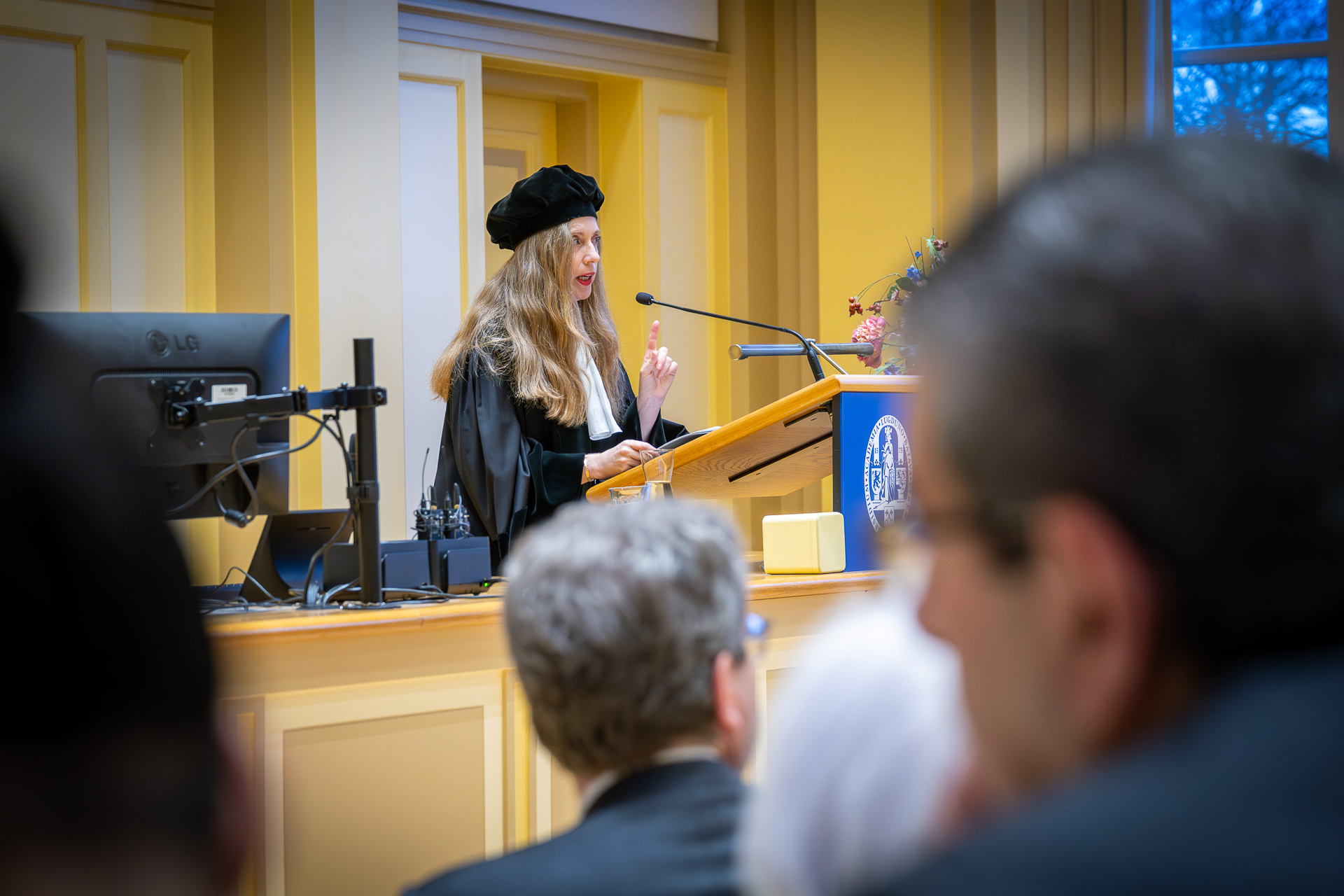
In her lecture political scientist Hélène Landemore called for randomly selected citizen assemblies -
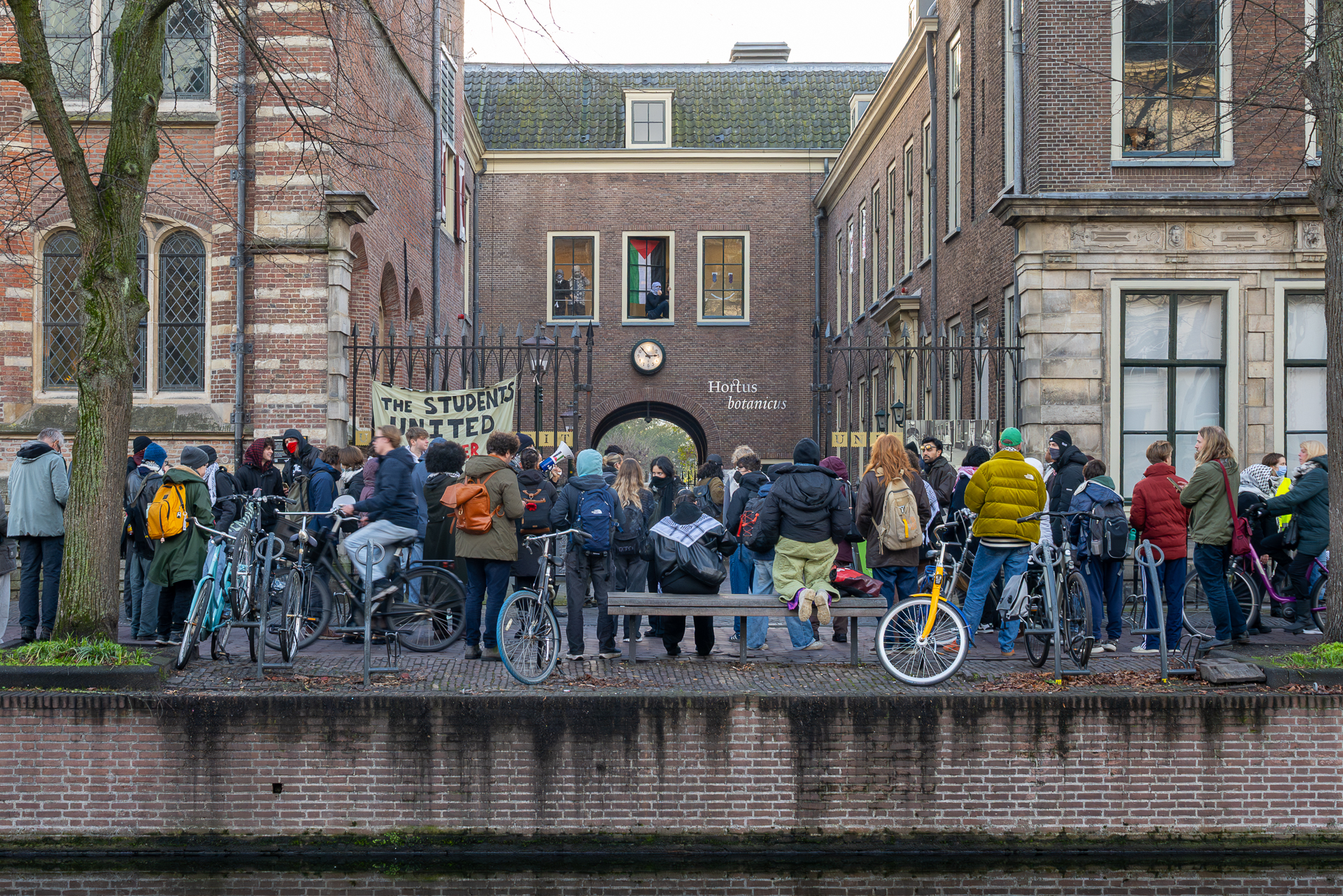
Protestors demonstrated at the Academy Building -
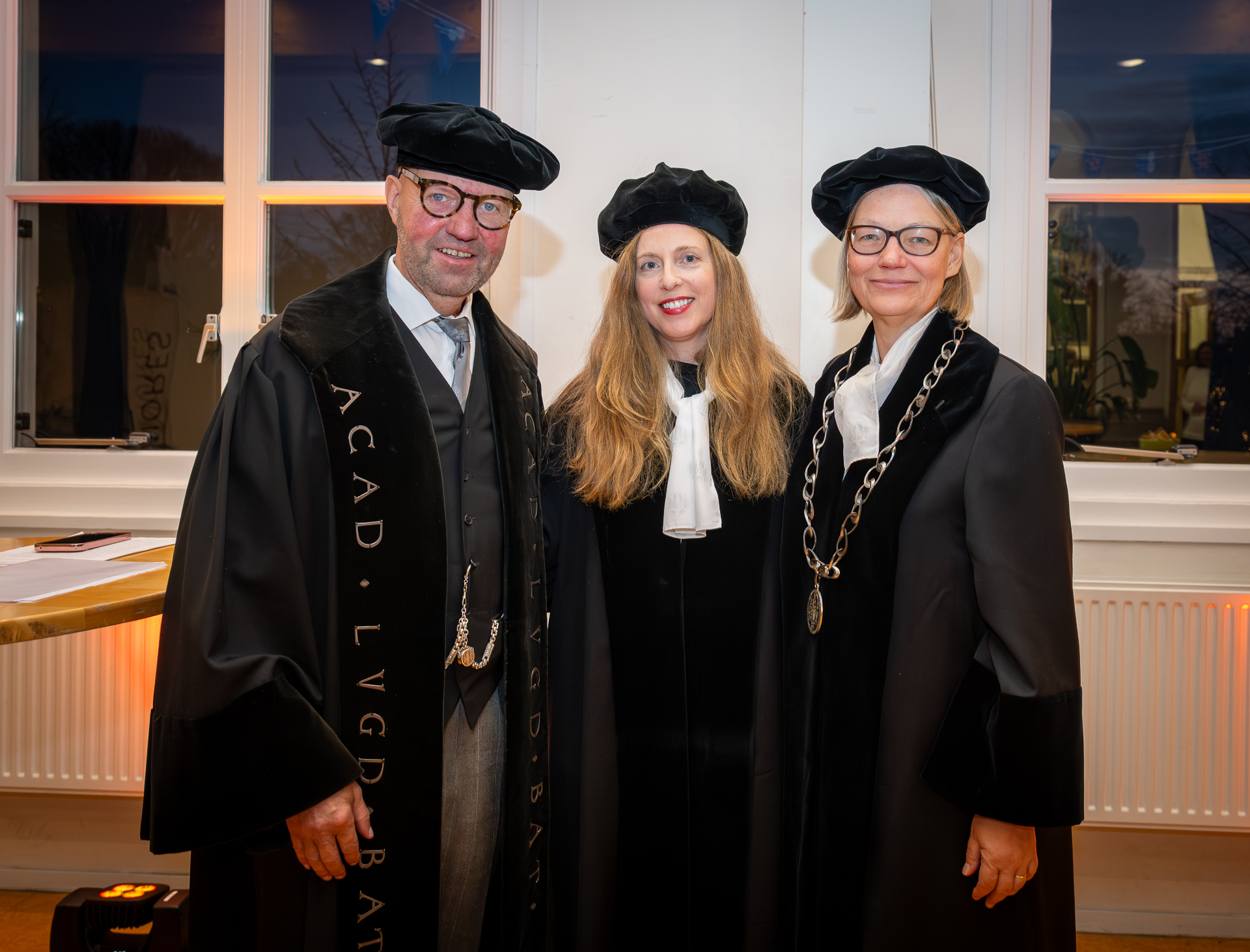
L-r.: Beadle Erick van Zuijlen, Cleveringa Professor Hélène Landemore and Rector Hester Bijl.
The ideal democracy
What would the ideal democracy look like? Landemore outlined three models: the market, the forum and the jury. The market model sees politics as akin to a business transaction and the citizen as a consumer of policies. The forum model views politics as an open deliberative space and the citizen as a bearer and assessor of reasons for and against policies. The jury model construes politics as a space for deliberation and decision-making among peers selected by lot.
Landemore explored how the three models might be articulated in a democracy. ‘In a functional democracy, a version of all three might need to be present to a more or less pronounced degree. We should, nevertheless, value distinguishing them so as to measure what trade-offs or reforms are worth considering.’
The market
The market model views democracy as a method for elite selection, whereby the system grants citizens one vote. ‘The citizen acts only as a voter, pursuing his own, narrow, self-interest.’ This makes the citizen a passive consumer with little influence on political decisions.
A disadvantage of this model is that competition for votes leads to polarisation and conflict. ‘Political choices should not be conceptualised as market choices,’ said Landemore. ‘When I choose a TV, my choice only affects me. When I choose a policy on immigration or tax rates, my choice affects me and everyone around me.’
The forum
In the forum model, democracy is not merely about selecting leaders or policies. ‘It is about citizens engaging in reasoned discussion to form collective judgments.’ The model emphasises inclusivity, transparency and reason-giving. ‘The beauty of this model is that it elevates the citizen from consumer to reasoner and talker, from someone purely concerned with their own self-interest to a genuine citizen, also concerned with the common good.’
Yet the forum model is not without challenges: it cannot fully accommodate the mass scale of modern democracy. ‘Deliberation among all at the scale of nation-states would take too many evenings,’ said Landemore. ‘Deliberation among elected representatives is just as elitist as in the market model. Meanwhile, the deliberation in which most ordinary citizens participate takes place outside the sphere of decision-making and is at the mercy of all kinds of manipulative forces, such as interest groups or AI-bots.’
The jury
Given the pros and cons of the market and forum models, Landemore proposed turning to the jury model. In this model, a randomly selected group of citizens are entrusted with deliberating and deciding on policy questions or legislative proposals. Like the forum model, the jury model relies on a division of labour between citizens and representatives. But this division of labour does not create a massive gap between the decision-making elites and the public because representatives are randomly selected. ‘This ensures that the group of decision-makers is broadly demographically representative of the larger public.’
To date, no democracy has been primarily structured by the jury model. ‘Most citizens’ assemblies have a purely advisory role. While they can contribute to shaping a conversation, they don’t have the power to initiate legislative proposals.’ The most formally empowered citizens’ assembly to date, said Landemore, was the French Citizens’ Convention for Climate (2019-2020). This process outsourced the legislative prerogative of the Prime Minister’s office to 150 random citizens.
The best path
If we were starting from scratch, Landemore would recommend implementing the jury model. But as we are not, she felt the best path would be a form of institutional hybridisation: to keep elections (the market model), operate against the background of a free and open public sphere (forum model) and introduce structured, empowered citizens’ assemblies (the jury model) at all levels of the political system.
‘I hope this typology of models and the set of questions it invites can be useful as we try to shore up our systems and prevent our democracies from backsliding any further,’ she concluded. ‘What these three models suggest is that there is not one single institutional or final blueprint for democracy. Democracy is an open-ended project of citizen inclusion and empowerment that we can only hope to perfect through constant experimentation and rethinking.’
Introduction by Rector Hester Bijl
In her welcome speech, Rector Magnificus Hester Bijl reflected on Cleveringa’s protest speech. ‘Cleveringa symbolises all those courageous students and staff from our university who refused to submit to the Nazi regime, and who together ensured that our university as a collective did not succumb.’
Bijl said that Landemore’s research ‘enriches our university’, adding that, ‘It is a wonderful addition to our work on the resilience of democracy and trust in institutions. It also feeds into our university-wide research on the societal impact of AI, and it connects with our long-standing tradition of studying how digital technology can improve the law – a tradition that began when none of us had computers at home.’
Re-watch
Due to the selected cookie settings, we cannot show this video here.
Watch the video on the original website or